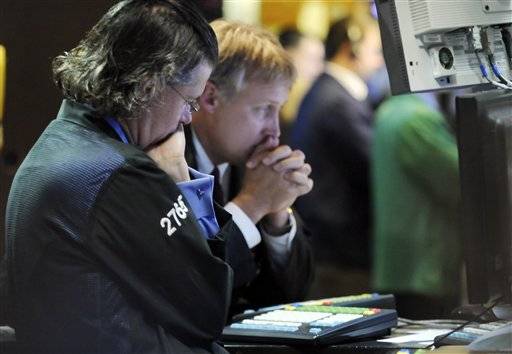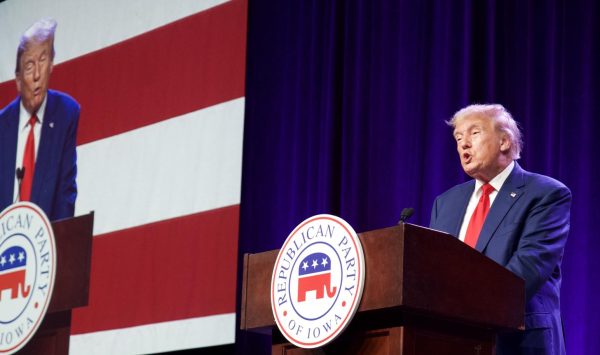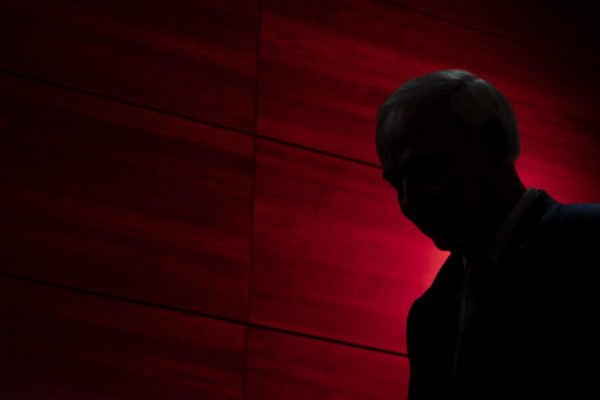Stocks tumble as investors shift focus to economy

A pair of specialists work at their post on the floor of the New York Stock Exchange, Wednesday Oct. 22, 2008. Wall Street tumbled again Wednesday as investors worried that the global economy is poised to weaken even as parts of the credit market slowly show signs of recovery. The major indexes fell more than 4 percent, including the Dow Jones industrial average, which fell 515 points. (AP Photo/Richard Drew)
November 5, 2008
NEW YORK — Wall Street stopped to catch its breath Wednesday,cashing in gains from a rally that lifted the Standard & Poor’s 500 index more than 18 percent over six sessions. Stocks showed little change after a report that the U.S. services sector contracted sharply in October.
Investors were collecting profits after the market’s run-up, including a rally Tuesday that sent the Dow up more than 300 points on expectations that battered stocks would enjoy a traditional year-end rally. Analysts said the market anticipated a win by Barack Obama in the presidential election, and so the voting had little if any impact on Wednesday’s trading.
“It’s virtually all technical, psychological, and very little to do with politics,” said Jack A. Ablin, chief investment officer at Harris Private Bank. “Everyone was buying the rumor yesterday and selling the news today … The market had not only anticipated an Obama victory, but from what I’m gleaning, pretty much a Democratic sweep.
“Everything pretty much occurred as expected, so now we’re kind of moving on to the next thing,” he said. Most investors are probably focusing on the Labor Department’s October employment report Friday, he said.
Economists on average expect a 200,000 drop in payrolls, according to Thomson/IFR. Employers have been slashing jobs after a freeze-up in the credit markets crippled many companies’ ability to get financing.
The Institute for Supply Management said its services sector index fell to 44.4 in October from 50.2 in September. That’s a steeper drop than the market expected, but analysts said investors have largely factored in negative economic news for the time being. The major indexes showed little change in response to the ISM report.
In midmorning trading, the Dow Jones industrial average fell 95.82, or 1.00 percent, to 9,529.46.
The S&P 500 index fell 8.12, or 0.81 percent, to 997.63, while the Nasdaq composite index fell 20.27, or 1.14 percent, to 1,759.85.
The Russell 2000 index of smaller companies fell 5.64, or 1.03 percent, to 540.33.
Declining issues outnumbered advancers by about 2 to 1 on the New York Stock Exchange, where volume came to a light 268.25 million shares.
Now that the election is over, investors will be assessing the economic landscape ahead under Obama’s leadership. He faces an enormous budget deficit when he is sworn in Jan. 20. The current administration Wednesday will detail its plans to borrow a record $550 billion in the final three months of the year for the financial rescue efforts made in response to the global crisis.
A Treasury Department official Monday projected the government would need to borrow an additional $368 billion in the first quarter of 2009.
Meanwhile, the state of the credit markets — which largely contributed to the violent swings in the market in recent weeks — is improving but is still far from healthy.
Banks continued to ratchet down the rates they charge one another for borrowing, but the key interbank lending rate — the London Interbank Offered Rate, or Libor — remains well above the Federal Reserve’s target interest rate of 1.00 percent. Libor for three-month dollar loans fell to 2.51 percent Wednesday from 2.71 percent Tuesday.
And the bid for Treasury bills remains high. The three-month bill, considered one of the safest assets around, fell slightly to 0.46 percent from 0.48 percent late Tuesday. A low yield indicates high demand.
The yield on the benchmark 10-year Treasury note fell to 3.72 percent from 3.73 percent late Tuesday.
The dollar fell against most other major currencies. Gold prices rose.
Light, sweet crude fell $2.38 to $68.15 a barrel on the New York Mercantile Exchange.
In Asian trading, Japan’s Nikkei index rose 4.46 percent, and Hong Kong’s Hang Seng Index rose 3.17 percent. In afternoon trading in Europe, Britain’s FTSE 100 fell 2.06 percent, Germany’s DAX index fell 0.98 percent, and France’s CAC-40 fell 2.31 percent.














